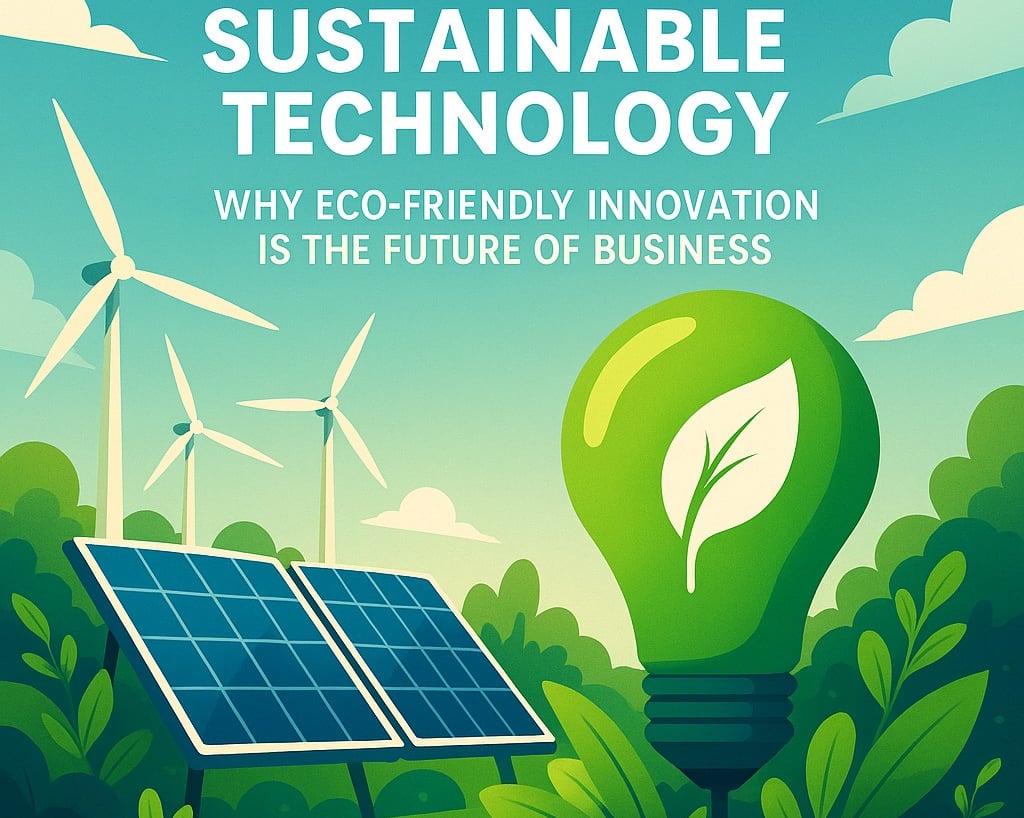The Rise of Sustainable Technology: Why Eco-Friendly Innovation is the Future of Business
As environmental concerns intensify, businesses are turning to sustainable technology to reduce their carbon footprint, lower costs, and meet evolving consumer expectations. Discover how eco-friendly innovation is reshaping industries and driving responsible growth.
9/27/20242 min read


The Rise of Sustainable Technology: Why Eco-Friendly Innovation is the Future of Business
In an era marked by climate change, resource depletion, and growing environmental awareness, the role of technology is undergoing a profound shift. No longer is innovation measured solely by speed, power, or cost-efficiency; today’s most impactful advancements are those that balance performance with sustainability. Across industries, sustainable technology is gaining momentum—and businesses that embrace it are not only helping the planet but also strengthening their competitive edge.
Sustainable technology refers to products, services, and practices that minimize environmental impact while promoting long-term ecological balance. It’s not just about using less energy; it’s about rethinking how technology is designed, produced, used, and disposed of in ways that align with global sustainability goals.
Why Sustainable Technology Matters Now More Than Ever
Environmental concerns are no longer a niche conversation—they’re front and center for governments, investors, consumers, and employees alike. Regulations aimed at reducing carbon emissions are expanding globally. Consumers are increasingly prioritizing eco-friendly brands. And businesses are under pressure to disclose their sustainability efforts as part of ESG (Environmental, Social, and Governance) reporting.
In this landscape, sustainable technology isn’t just a feel-good initiative—it’s a business imperative. Companies that fail to adopt greener technologies risk falling behind competitors, facing regulatory penalties, and losing favor with environmentally conscious customers.
On the flip side, organizations that invest in sustainable technology can unlock new opportunities, from operational cost savings to enhanced brand loyalty and access to emerging green markets.
Key Trends Driving Sustainable Technology
Several technological trends are fueling the rise of sustainability in the tech sector:
✅ Energy-Efficient Hardware: Manufacturers are designing laptops, servers, and networking equipment that consume less energy while delivering higher performance. Cloud providers are building data centers powered by renewable energy sources, dramatically reducing their carbon footprints.
✅ Circular Economy Solutions: Instead of producing tech destined for landfills, companies are embracing circular models—designing products for reuse, refurbishment, and recycling. Initiatives like device take-back programs and modular hardware design extend the lifecycle of tech products and reduce electronic waste.
✅ Sustainable Software Development: It’s not just hardware that matters—software can be optimized for sustainability too. Developers are increasingly focusing on reducing the energy demands of code, algorithms, and applications, leading to lower power consumption across devices and servers.
✅ Green Cloud Computing: Cloud platforms are adopting renewable energy and carbon-neutral strategies to attract sustainability-conscious customers. Enterprises migrating to green cloud solutions can reduce IT emissions without sacrificing scalability or performance.
✅ Smart Technologies for Resource Efficiency: IoT sensors, AI-driven monitoring, and automation tools help businesses optimize energy use, water consumption, and waste management across facilities, supply chains, and operations.
Sustainable Tech as a Competitive Advantage
Forward-thinking businesses view sustainable technology not as an obligation, but as an opportunity to lead. By adopting eco-friendly solutions, companies can achieve cost savings through energy efficiency, gain market differentiation, and foster deeper trust with environmentally conscious consumers.
Moreover, sustainability initiatives contribute to stronger employee engagement, as today’s workforce increasingly prefers to work for organizations aligned with social and environmental values.
Sustainable technology also opens doors to innovative business models—from subscription-based access to hardware (instead of ownership) to services that extend the life and value of existing products.
Conclusion: Building a Sustainable Future Through Technology
As environmental concerns grow, sustainable technology is no longer optional—it’s essential. Companies that embrace eco-friendly innovation position themselves as leaders in a world demanding responsibility and action. By adopting sustainable practices today, businesses not only reduce their ecological footprint but also future-proof their operations for the challenges and opportunities of tomorrow.
In the end, sustainability and technology aren’t opposing forces—they’re powerful allies in building a resilient, ethical, and thriving future for all.
813-419-7227
© Copyright TWO WOLVES DEFENSE AND SECURITY. All rights reserved.

